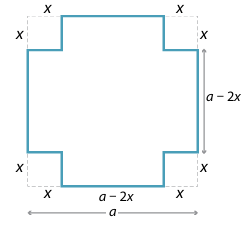APPLICATION OF DIFFERENTIATION MAXIMUM AND MINIMUM
Subscribe to our ▶️ YouTube channel 🔴 for the latest videos, updates, and tips.
Optimization is a process of finding an extreme value (either maximum or minimum) under certain conditions.
A procedure for solving for an extremum or optimization problems.
Step 1 :
Draw an appropriate figure and label the quantities relevant to the problem.
Step 2 :
Find a expression for the quantity to be maximized or minimized.
Step 3 :
Using the given conditions of the problem, the quantity to be extremized .
Step 4 :
Determine the interval of possible values for this variable from the conditions given in the problem.
Step 5 :
Using the techniques of extremum (absolute extremum, first derivative test or second derivative test) obtain the maximum or minimum.
Problem 1 :
Find two positive numbers whose sum is 12 and their product is maximum.
Solution :
Let one number be x. The other number is 12 - x.
Let f(x) be the function
f(x) = Product of two numbers
f(x) = x(12 - x)
f(x) = 12x - x2
f'(x) = 12-2x
f'(x) = 0
12-2x = 0
x = 6
f''(x) = -2 < 0 Maximum
The first number is 6 and the another number is 6.
Product of two numbers = 36.
Problem 2 :
Find two positive numbers whose product is 20 and their sum is minimum.
Solution :
Let x be the one number, then the another number = 20/x
Let f(x) be the function.
f(x) = x + (20/x)
f'(x) = 1 - 20/x2
f'(x) = 0
1 - 20/x2 = 0
20/x2 = 1
x2 = 20
x = 2√5
f''(x) = -40/x3 < 0
f''(2√5) = -1/√5 < 0 (maximum)
Another number = 20/2√5 = 2√5
So, the sum of numbers = 2√5 + 2√5 ==> 4√5.
Problem 3 :
Find the smallest possible value of
x2 + y2
given that x + y =10.
Solution :
Let f(x) be the function.
Given :
x+y = 10
y = 10-x
f(x) = x2 + y2
f(x) = x2 + (10-x)2
f(x) = x2 + 100+x2-20x
f(x) = 2x2-20x+100
f'(x) = 4x-20
f'(x) = 0
4x-20 = 0
x = 5
f''(x) = 4(1) ==> 4 > 0 (Minimum)
y = 10-x
y = 10-5
y = 5
x2 + y2 = 52 + 52
x2 + y2 = 50
So, the value of x2 + y2 is 50.
Problem 4 :
A garden is to be laid out in a rectangular area and protected by wire fence. What is the largest possible area of the fenced garden with 40 meters of wire.
Solution :
Let x and y be the length and width of the rectangle.
2(x + y) = 40
2x + 2y = 40
2y = 40-2x
y = 20 - x
Area of rectangle = x(20 - x)
A(x) = 20x - x2
A'(x) = 20 - 2x
A'(x) = 20-2x = 0
x = 10
A''(x) = -2 < 0 (Maximum)
y = 20-10
y = 10
Area = 10(10)
= 100 m2
So, area of the rectangle is 100 m2.
Problem 5 :
A square sheet of cardboard with each side a centimeters is to be used to make an open top box by cutting a small square of cardboard from each of the corners and bending up the sides. What is the side length of small squares if the box is to have large a volume as possible ?
Solution :

Let x be the side length of small square box.
Volume of the box = length x width x height
= (a - 2x) ⋅ (a - 2x) ⋅ x
V(x) = (a - 2x)2 ⋅ x
v'(x) = (a - 2x)2 ⋅ (1) + 2(a - 2x) (-2) x
= (a - 2x)2 - 4x(a - 2x)
= (a - 2x)[a - 2x - 4x]
v'(x) = (a - 2x)(a - 6x)
v'(x) = 0
(a - 2x)(a - 6x) = 0
|
a - 2x = 0 2x = a x = a/2 |
a - 6x = 0 6x = a x = a/6 |
v'(x) = (a - 2x)(a - 6x)
v''(x) = (a - 2x)(- 6(1)) + (a - 6x)(0 - 2(1))
= -6(a - 2x) - 2(a - 6x)
= -6a + 12x - 2a + 12x
= -8a + 24x
= 8(3x - a)
|
When x = a/2 v''(x) = 8(3x - a) v''(a/2) = 8(3(a/2) - a) = 8(3a - 2a)/2 = 4a > 0 Minimum |
When x = a/6 v''(x) = 8(3x - a) v''(a/6) = 8(3(a/6) - a) = 8((a/2) - a) = 8(a - 2a)/2 = -8a/2 = -4a < 0 Maximum |
To find the maximum value of the function, we have to apply x = a/6 in the function V(x) = (a - 2x)2 ⋅ x
V(a/6) = (a - 2(a/6))2 ⋅ (a/6)
= (a - (a/3))2 ⋅ (a/6)
= ((3a - a)/3))2 ⋅ (a/6)
= (2a /3)2 ⋅ (a/6)
= (4a2/9) ⋅ (a/6)
= 2a3/27
So, the maximum volume is 2a3/27
Subscribe to our ▶️ YouTube channel 🔴 for the latest videos, updates, and tips.
Kindly mail your feedback to v4formath@gmail.com
We always appreciate your feedback.
About Us | Contact Us | Privacy Policy
©All rights reserved. onlinemath4all.com

Recent Articles
-
10 Hard SAT Math Questions (Part - 42)
Dec 30, 25 05:52 AM
10 Hard SAT Math Questions (Part - 42) -
10 Hard SAT Math Questions (Part - 38)
Dec 29, 25 04:21 AM
10 Hard SAT Math Questions (Part - 38) -
10 Hard SAT Math Questions (Part - 39)
Dec 28, 25 11:20 PM
10 Hard SAT Math Questions (Part - 39)
